外研版七年级上册 Module 8 Unit 3 Language in use.课件(共20张PPT)
文档属性
| 名称 | 外研版七年级上册 Module 8 Unit 3 Language in use.课件(共20张PPT) |

|
|
| 格式 | pptx | ||
| 文件大小 | 988.6KB | ||
| 资源类型 | 教案 | ||
| 版本资源 | 外研版 | ||
| 科目 | 英语 | ||
| 更新时间 | 2023-08-29 17:24:51 | ||
图片预览

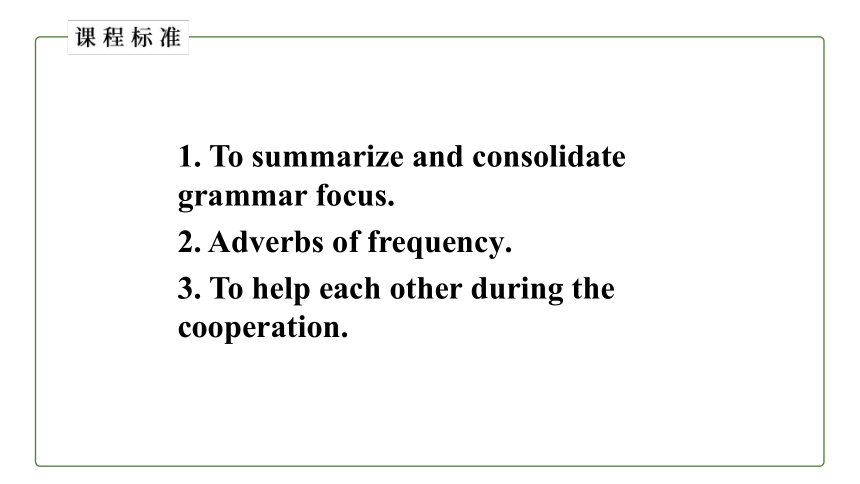
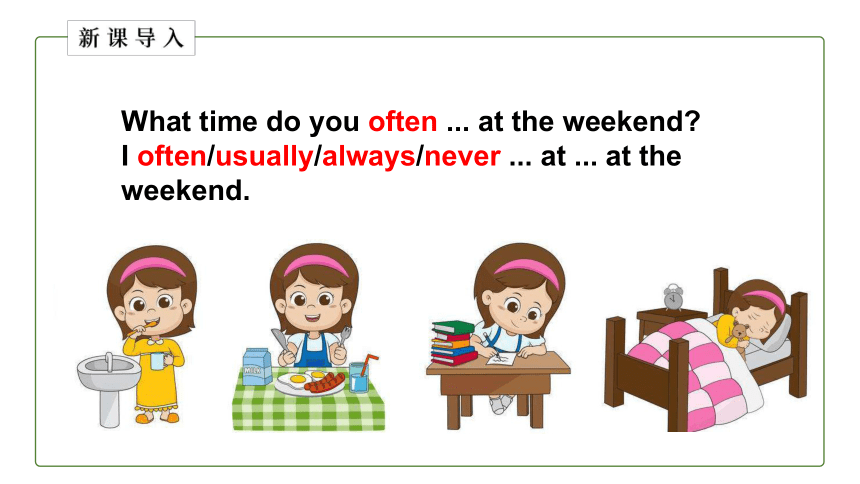
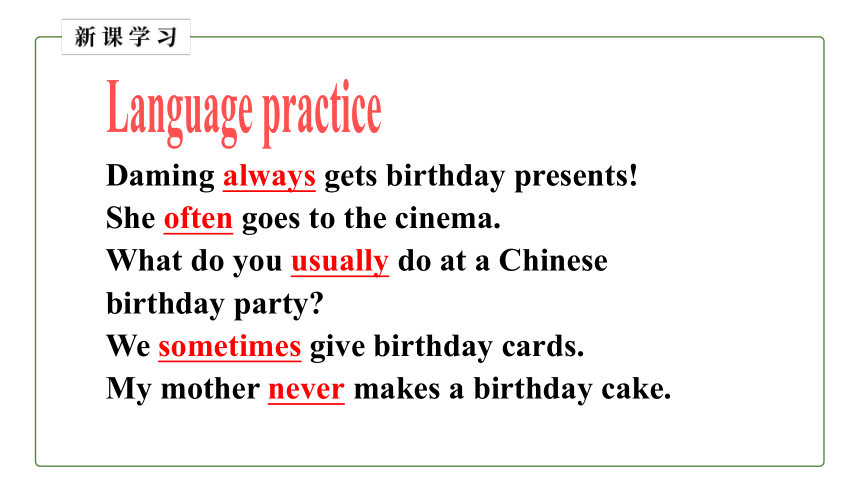
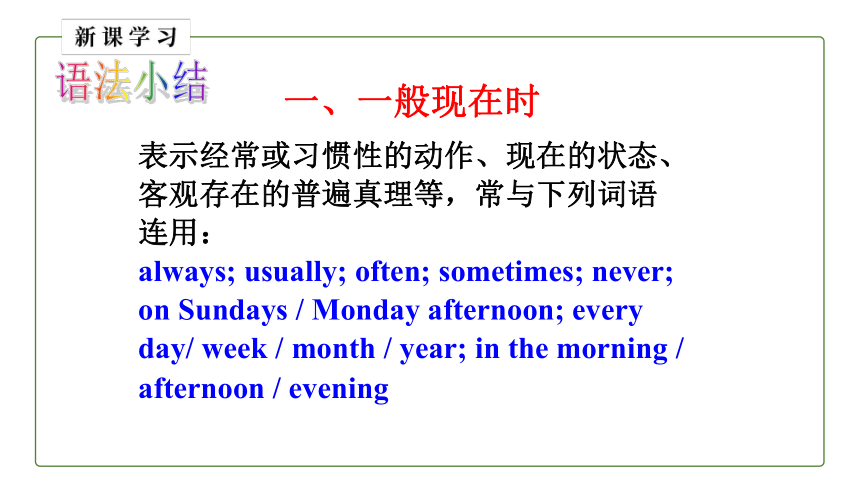
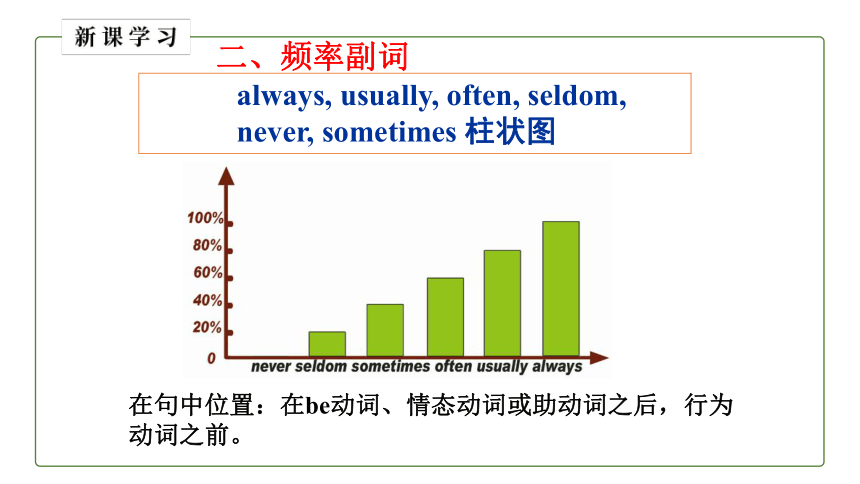
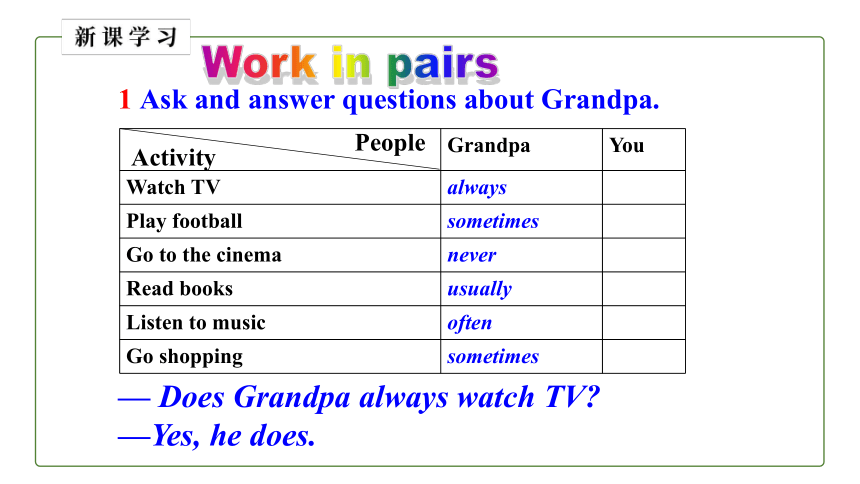
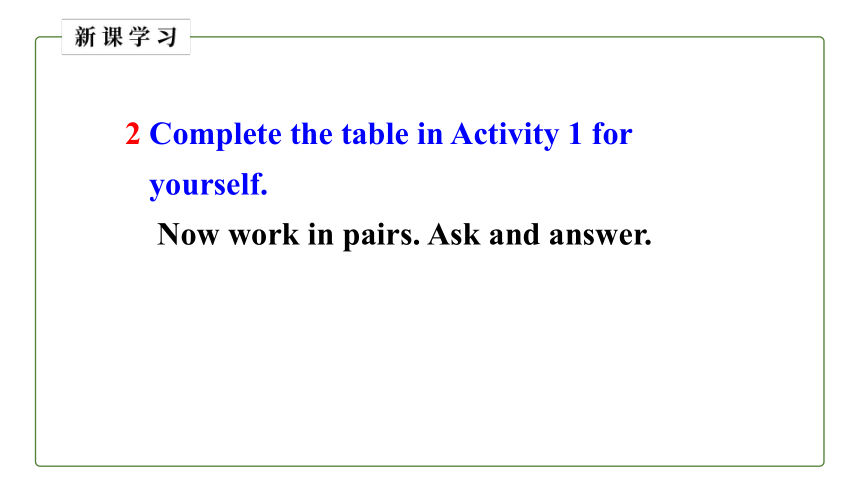
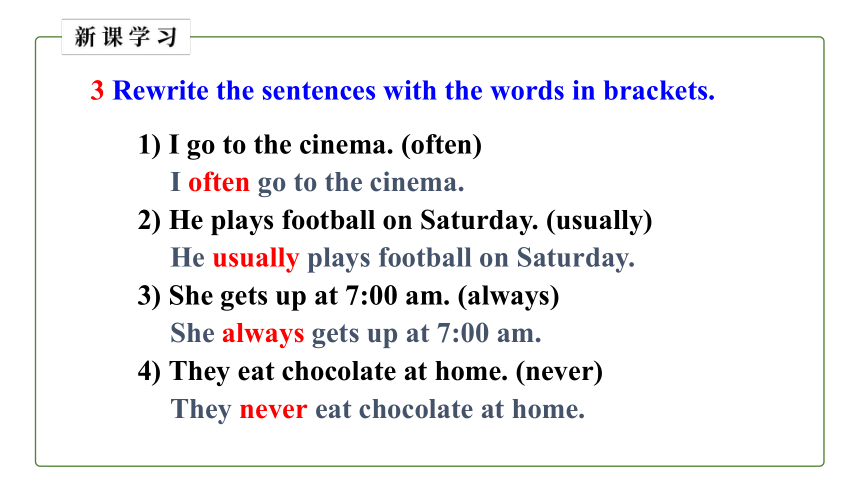
文档简介
(共20张PPT)
Module 8 Choosing presents
Unit 3 Language in use
1. To summarize and consolidate grammar focus.
2. Adverbs of frequency.
3. To help each other during the cooperation.
What time do you often ... at the weekend
I often/usually/always/never ... at ... at the weekend.
Language practice
Daming always gets birthday presents!
She often goes to the cinema.
What do you usually do at a Chinese birthday party
We sometimes give birthday cards.
My mother never makes a birthday cake.
一、一般现在时
表示经常或习惯性的动作、现在的状态、客观存在的普遍真理等,常与下列词语
连用:
always; usually; often; sometimes; never;
on Sundays / Monday afternoon; every day/ week / month / year; in the morning / afternoon / evening
语法小结
always, usually, often, seldom,
never, sometimes 柱状图
二、频率副词
在句中位置:在be动词、情态动词或助动词之后,行为动词之前。
1 Ask and answer questions about Grandpa.
Grandpa You
Watch TV always
Play football sometimes
Go to the cinema never
Read books usually
Listen to music often
Go shopping sometimes
People
Activity
Work in pairs
— Does Grandpa always watch TV
—Yes, he does.
2 Complete the table in Activity 1 for
yourself.
Now work in pairs. Ask and answer.
3 Rewrite the sentences with the words in brackets.
1) I go to the cinema. (often)
2) He plays football on Saturday. (usually)
3) She gets up at 7:00 am. (always)
4) They eat chocolate at home. (never)
I often go to the cinema.
He usually plays football on Saturday.
She always gets up at 7:00 am.
They never eat chocolate at home.
4 Complete the sentences with Would you like … or Let’s.
Would you like to go to the playground and play football
1. ______________ to go to the football match
2. _____ go to a taijiquan class.
3. _____ stay at home.
4. ______________ to go to the cinema
It’s Jackie Chan.
5. ______________ to watch TV
6. _____ play basketball.
Would you like
Let’s
Let’s
Would you like
Would you like
Let’s
Would you like+to do sth.
Let’s +do sth.
两者都用于表示请求或建议。
5 Read the emails and check the true sentences.
1) Mike’s birthday party begins at 4:00 pm.
2) Jane doesn’t want to go to the party.
3) Jack has got a little sister.
4) Jack always does his homework on Saturday afternoon.
Read and answer.
In the UK, what do people give to children as birthday presents
6 Work in pairs. Ask and answer questions about each other’s birthday party.
1) When is your birthday
2) Do you always have a birthday party
3) What do you usually do at your birthday
party
7 Plan a birthday party for your partner.
Choose the time and place.
Choose the food.
Choose what to do.
8 Work with the whole class. Describe your
plans for your partner’s birthday party.
Don’t say who your partner is.
Now guess who your partner is.
1. He _______ TV every evening. (watch)
2. We always ___ to school on foot. (go)
3. Tom, with his classmates, often _____
football after school. (play)
4. Your shoes _____ under the bed. (be)
5. His uncle usually ____ to work by bus.
(go)
6. I always ___ up at six in the morning.
(get)
7. He never ______ a cake himself. (make)
8. John _____ like his father. (look)
一、用所给动词的适当形式填空。
watches
go
plays
are
goes
get
makes
looks
二、翻译下列句子。
1.我在电视上知道这个消息。
___________________________________
2.他们不经常去看电影。
___________________________________3.我父母星期天不去看音乐会。
____________________________________________________________________
I know the news on television.
They don’t often go to the cinema.
My parents don’t go to concerts on Sunday.
4.我妹妹经常不看杂志。
___________________________________
5.Betty在生日时不常开晚会。
_____________________________________________________________________
6.她的生日礼物是一条丝绸围巾。
__________________________________
My sister doesn’t often read magazines.
Betty doesn’t usually have party on her birthday.
Her birthday present is a silk scarf.
1. 频度副词的用法。
2. 如何为伙伴计划一个生日聚会。
Finish the workbook.
Write a passage to describe a party.
Module 8 Choosing presents
Unit 3 Language in use
1. To summarize and consolidate grammar focus.
2. Adverbs of frequency.
3. To help each other during the cooperation.
What time do you often ... at the weekend
I often/usually/always/never ... at ... at the weekend.
Language practice
Daming always gets birthday presents!
She often goes to the cinema.
What do you usually do at a Chinese birthday party
We sometimes give birthday cards.
My mother never makes a birthday cake.
一、一般现在时
表示经常或习惯性的动作、现在的状态、客观存在的普遍真理等,常与下列词语
连用:
always; usually; often; sometimes; never;
on Sundays / Monday afternoon; every day/ week / month / year; in the morning / afternoon / evening
语法小结
always, usually, often, seldom,
never, sometimes 柱状图
二、频率副词
在句中位置:在be动词、情态动词或助动词之后,行为动词之前。
1 Ask and answer questions about Grandpa.
Grandpa You
Watch TV always
Play football sometimes
Go to the cinema never
Read books usually
Listen to music often
Go shopping sometimes
People
Activity
Work in pairs
— Does Grandpa always watch TV
—Yes, he does.
2 Complete the table in Activity 1 for
yourself.
Now work in pairs. Ask and answer.
3 Rewrite the sentences with the words in brackets.
1) I go to the cinema. (often)
2) He plays football on Saturday. (usually)
3) She gets up at 7:00 am. (always)
4) They eat chocolate at home. (never)
I often go to the cinema.
He usually plays football on Saturday.
She always gets up at 7:00 am.
They never eat chocolate at home.
4 Complete the sentences with Would you like … or Let’s.
Would you like to go to the playground and play football
1. ______________ to go to the football match
2. _____ go to a taijiquan class.
3. _____ stay at home.
4. ______________ to go to the cinema
It’s Jackie Chan.
5. ______________ to watch TV
6. _____ play basketball.
Would you like
Let’s
Let’s
Would you like
Would you like
Let’s
Would you like+to do sth.
Let’s +do sth.
两者都用于表示请求或建议。
5 Read the emails and check the true sentences.
1) Mike’s birthday party begins at 4:00 pm.
2) Jane doesn’t want to go to the party.
3) Jack has got a little sister.
4) Jack always does his homework on Saturday afternoon.
Read and answer.
In the UK, what do people give to children as birthday presents
6 Work in pairs. Ask and answer questions about each other’s birthday party.
1) When is your birthday
2) Do you always have a birthday party
3) What do you usually do at your birthday
party
7 Plan a birthday party for your partner.
Choose the time and place.
Choose the food.
Choose what to do.
8 Work with the whole class. Describe your
plans for your partner’s birthday party.
Don’t say who your partner is.
Now guess who your partner is.
1. He _______ TV every evening. (watch)
2. We always ___ to school on foot. (go)
3. Tom, with his classmates, often _____
football after school. (play)
4. Your shoes _____ under the bed. (be)
5. His uncle usually ____ to work by bus.
(go)
6. I always ___ up at six in the morning.
(get)
7. He never ______ a cake himself. (make)
8. John _____ like his father. (look)
一、用所给动词的适当形式填空。
watches
go
plays
are
goes
get
makes
looks
二、翻译下列句子。
1.我在电视上知道这个消息。
___________________________________
2.他们不经常去看电影。
___________________________________3.我父母星期天不去看音乐会。
____________________________________________________________________
I know the news on television.
They don’t often go to the cinema.
My parents don’t go to concerts on Sunday.
4.我妹妹经常不看杂志。
___________________________________
5.Betty在生日时不常开晚会。
_____________________________________________________________________
6.她的生日礼物是一条丝绸围巾。
__________________________________
My sister doesn’t often read magazines.
Betty doesn’t usually have party on her birthday.
Her birthday present is a silk scarf.
1. 频度副词的用法。
2. 如何为伙伴计划一个生日聚会。
Finish the workbook.
Write a passage to describe a party.
同课章节目录
- Starte
- Module 1 My teacher and my friends
- Module 2 My English lesson
- Module 3 My English book
- Module 4 My everyday life
- Module 1 My classmates
- Unit 1 Nice to meet you.
- Unit 2 I'm Wang Lingling and I'm thirteen years ol
- Unit 3 Language in use.
- Module 2 My family
- Unit 1 Is this your mum?
- Unit 2 These are my parents.
- Unit 3 Language in use.
- Module 3 My school
- Unit 1 There are thirty students in my class.
- Unit 2 The library is on the left of the playgroun
- Unit 3 Language in use.
- Module 4 Healthy food
- Unit 1 We've got lots of apples.
- Unit 2 Is your food and drink healthy?
- Unit 3 Language in use.
- Module 5 My school day
- Unit 1 I love history.
- Unit 2 We start work at nine o'clock.
- Unit 3 Language in use.
- Revision module A
- Module 6 A trip to the zoo
- Unit 1 Does it eat meat?
- Unit 2 The tiger lives in Asia.
- Unit 3 Language in use.
- Module 7 Computers
- Unit 1 How do I write my homework on the computer?
- Unit 2 When do you use a computer?
- Unit 3 Language in use.
- Module 8 Choosing presents
- Unit 1 I always like birthday parties.
- Unit 2 She often goes to concerts.
- Unit 3 Language in use.
- Module 9 People and places
- Unit 1 We're enjoying the school trip a lot.
- Unit 2 They're waiting for buses or trains.
- Unit 3 Language in use.
- Module 10 Spring Festival
- Unit 1 Are you getting ready for Spring Festival?
- Unit 2 My mother's cleaning our houses and sweepin
- Unit 3 Language in use.
- Revision module B
